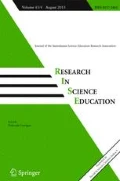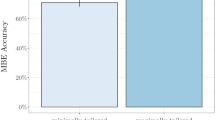Abstract
Grading practices can send a powerful message to students about course expectations. A study by Henderson et al. (American Journal of Physics 72:164–169, 2004) in physics education has identified a misalignment between what college instructors say they value and their actual scoring of quantitative student solutions. This work identified three values that guide grading decisions: (1) a desire to see students’ reasoning, (2) a readiness to deduct points from solutions with obvious errors and a reluctance to deduct points from solutions that might be correct, and (3) a tendency to assume correct reasoning when solutions are ambiguous. These authors propose that when values are in conflict, the conflict is resolved by placing the burden of proof on either the instructor or the student. Here, we extend the results of the physics study to earth science (n = 7) and chemistry (n = 10) instructors in a think-aloud interview study. Our results suggest that both the previously identified three values and the misalignment between values and grading practices exist among science faculty more generally. Furthermore, we identified a fourth value not previously recognized. Although all of the faculty across both studies stated that they valued seeing student reasoning, the combined effect suggests that only 49% of faculty across the three disciplines graded work in such a way that would actually encourage students to show their reasoning, and 34% of instructors could be viewed as penalizing students for showing their work. This research may contribute toward a better alignment between values and practice in faculty development.





Similar content being viewed by others
References
Ault, C. R. (1994). Research on problem solving: Earth science. In D. Gabel (Ed.), Handbook of research on science teaching and learning. New York: Macmillan.
Black, P., & Wiliam, D. (1998). Assessment and classroom learning. Assessment in Education, 5, 7–74.
Black, P., Harrison, C., Lee, C., Marshall, B., & Wiliam, D. (2003). Assessment for learning: Putting it into practice. New York: Open University Press.
Blase, J., & Blase, J. (1999). Principals’ instructional leadership and teacher development: teachers’ perspectives. Educational Administration Quarterly, 35, 349–378.
Brown, G., Bull, J., & Pendlebury, M. (1997). Assessing student learning in higher education. London: Routledge.
Camacho, M., & Good, R. (1989). Problem-solving and chemical equilibrium: successful versus unsuccessful performance. Journal of Research in Science Teaching, 26, 251–272.
Chi, M. T., Feltovich, P. J., & Glaser, R. (1981). Categorizations and representations of physics problems by experts and novices. Cognitive Science, 5, 121–152.
Cooper, M. M., Cox, C. T., Jr., Nammouz, M., Case, E., & Stevens, R. (2008). An assessment of the effect of collaborative groups on students’ problem-solving strategies and abilities. Journal of Chemical Education, 85(6), 866–872.
Elby, A. (1999). Another reason physics students learn by rote. American Journal of Physics, 67, S52–S57.
Entwistle, A., & Entwistle, N. (1992). Experiences of understanding in revising for degree examinations. Learning and Instruction, 2, 1–22.
Ericsson, K. A., & Simon, H. A. (1980). Verbal reports as data. Psychological Review, 87, 215–251.
Gabel, D. L., & Bunce, D. M. (1994). Research on problem solving: Chemistry. In D. Gabel (Ed.), Handbook of research on science teaching and learning. New York: Macmillan.
Heller, P., & Hollabaugh, M. (1992). Teaching problem solving through cooperative grouping: 2. Designing problems and structuring groups. American Journal of Physics, 60, 637–645.
Henderson, C., Yerushalmi, E., Kuo, V. K., Heller, P., & Heller, K. (2004). Grading student problem solutions: the challenge of sending a consistent message. American Journal of Physics, 72, 164–169.
Hubball, H., Collins, J., & Pratt, D. (2005). Enhancing reflective teaching practices: implications for faculty development programs. Canadian Journal of Higher Education, 35(3), 57–81.
Kane, R., Sandretto, S., & Heath, C. (2004). Excellence in tertiary teaching: emphasising on reflective practice. Higher Education, 47, 283–310.
Kozma, R. B., & Russell, J. (1997). Multimedia and understanding: expert and novice responses to different representations of chemical phenomena. Journal of Research in Science Teaching, 34(9), 949–968.
Larkin, J. H. (Ed.). (1980). Teaching problem solving in physics: The psychological laboratory and the practical classroom. New Jersey: Erlbaum Associates.
Leonard, W. J., Dufrense, R. J., & Mestre, J. P. (1996). Using qualitative problem-solving strategies to highlight the role of conceptual knowledge in solving problems. American Journal of Physics, 64, 1495–1503.
Maloney, D. (1994). Research on problem solving: Physics. In D. Gabel (Ed.), Handbook of research on science teaching and learning. New York: Macmillan.
Manduca, C. A., Baer, E., Hancock, G., Macdonald, R. H., Patterson, S., Savina, M., et al. (2008). Making undergraduate geoscience quantitative. EOS, Transactions of the American Geophysical Union, 89(16), 149–150.
Mestre, J. P., Dufrense, R. J., Gerace, W. J., & Hardiman, P. T. (1993). Promoting skilled problem-solving behavior among beginning physics students. Journal of Research in Science Teaching, 30, 303–317.
Qin, Z., Johnson, D., & Johnson, R. (1995). Cooperative versus competitive efforts and problem solving. Review of Educational Research, 65(2), 129.
Ramsden, P. (2003). Learning to teach in higher education. London: Routledge.
Reif, F., & Scott, L. (1999). Teaching scientific thinking skills: students and computers coaching each other. American Journal of Physics, 67, 819–831.
Richardson, V. (1990). Significant and worthwhile change in teaching practice. Educational Researcher, 19(7), 10–18.
Rowe, M. B. (1974a). Wait time and rewards as instructional variables, their influence in language, logic, and fate control: part 1. Wait time. Journal of Research in Science Teaching, 11(2), 81–94.
Rowe, M. B. (1974b). Wait time and rewards as instructional variables, their influence in language, logic, and fate control: part 2. Rewards. Journal of Research in Science Teaching, 11(4), 291–308.
Rust, C. (2002). The impact of assessment on student learning. Active learning in higher education. London, CA, and New Delhi: SAGE Publications. doi:10.1177/1469787402003002004.
Schoenfeld, A. H. (1988). When good teaching leads to bad results: the disasters of “well-taught” mathematics courses. Educational Psychologist, 23, 145–166.
Schon, D. A. (1983). The reflective practitioner. New York: Basic Books.
Simon, D. P., & Simon, H. A. (Eds.). (1978). Individual differences in solving physics problems. Hillsdale, New Jersey: Lawrence Erlbaum Associates.
Stains, M., & Talanquer, V. (2008). Classification of chemical reactions: stages of expertise. Journal of Research in Science Teaching, 45(7), 771–793.
Strauss, A. L., & Corbin, J. (1990). Basics of qualitative research: Grounded theory practice and techniques. Newbury Park: SAGE Publications.
Van Heuvelen, A. (1991). Learning to think like a physicist: a reveiw of research-based instructional strategies. American Journal of Physics, 59, 891–897.
Walvoord, B. E., & Anderson, V. J. (Eds.). (2010). Effective grading: A tool for learning and assessment (2nd ed.). San Francisco: Jossey-Bass.
Acknowledgements
We would like to thank the faculty members who participated in this research project. Dr. Lisa DeChano-Cook and Dr. Robert Ruhf contributed to the development of the earth science problem and student solutions. Comments and feedback by faculty and graduate student colleagues Dr. David W. Rudge, Caitlin Callahan, Matthew Ludwig, and Kate Rowbotham have greatly improved this manuscript. We are also grateful to the two reviewers and editorial staff whose comments enhanced this paper. This project was funded in part by our university, and work by one graduate student researcher (JB) was funded in part by the National Science Foundation (USA) under grant #0733590.
Author information
Authors and Affiliations
Corresponding author
Rights and permissions
About this article
Cite this article
Petcovic, H.L., Fynewever, H., Henderson, C. et al. Faculty Grading of Quantitative Problems: A Mismatch between Values and Practice. Res Sci Educ 43, 437–455 (2013). https://doi.org/10.1007/s11165-011-9268-8
Published:
Issue Date:
DOI: https://doi.org/10.1007/s11165-011-9268-8




